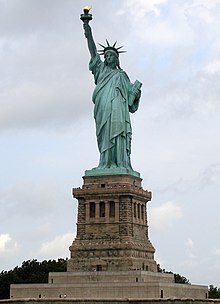Klasičan whataboutism, nemaš ti mene šta optužiti da genocidišem, a šta su Ameri tek radili indijancima?
Optužuješ Asada da je koristio kemijsko i biološko oružje protiv civila, pa šta i ako jest? Misliš da samo Amer ima pravo boginjama zaraziti indijance? Licemjeruuuuu

Sam pojam “whataboutism” su izmislili Amerikanci negodujući što se SSSR uopšte usuđivao da se poredi sa njima. Ovde se u školama predaje da su izuzetni, posebni, iznad svih ostalih i da kao takvi mogu sve - gomila puritanskih religijskih idiotizama o “sjajnom gradu na vrhu brda”, kome će “narodi zavideti”.
American exceptionalism is the belief that the
United States is either distinctive, unique, or exemplary compared to other
nations.
[1]Proponents of it argue that the
values,
political system, and
historical development of the U.S.are unique in
human history, often with the implication that it is both destined and entitled to play a distinct and positive role on the world stage.
[2][
unreliable source?]

The
Statue of Liberty contains several symbols associated with a combination of features unique to
the United States: the date of the
U.S. Declaration of Independence, a broken shackle and chain representing the abolition of
slavery, and a
torch symbolizing
enlightenment.
It originates in the observations and writings of French political scientist and historian
Alexis de Tocqueville, most notably in his comparison of the United States with
Great Britain and his native
France.
Tocqueville was the first writer to describe the country as "exceptional" following his travels there in 1831.
[3] The earliest documented use of the specific term "American exceptionalism" is by American communists in intra-communist disputes in the late 1920s.
[4]
Political scientist Seymour Martin Lipset argues that the United States is exceptional in that it started from a revolutionary event. He therefore traces the origins of American exceptionalism to the
American Revolution, from which the U.S. emerged as "the first new nation" with a distinct ideology.
[5] This ideology, which Lipset called
Americanism, but is often also referred to as American exceptionalism, is based on
liberty,
egalitarianism,
individualism,
republicanism,
democracy, and
laissez-faire economics; these principles are sometimes collectively referred to as "American exceptionalism".
[6] As a term in
social science, American exceptionalism refers to the United States' status as a global
outlier. Critics of the concept claim that the idea of American exceptionalism suggests that the US is better than other
countries, has a superior
culture, or has a unique mission to transform the planet and its inhabitants.
[7]
https://en.m.wikipedia.org/wiki/American_exceptionalism





